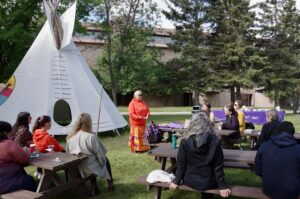Fort William Elder highlights reconciliation and Every Child Matters during Lakehead University’s Elder Tipi Talk

By Rick Garrick
THUNDER BAY — Fort William Elder Sheila DeCorte highlighted the National Day for Truth and Reconciliation and Every Child Matters during Lakehead University’s Elder Tipi Talk on Sept. 13 at the Agora Circle on the Thunder Bay campus.
“It all stems from the Residential Schools, all those hearings that started from our Elders speaking the truth and finally being heard,” DeCorte says. “Some of these stories are so horrific that you think that, ‘How could that even be possible? How could that even be true?’ When the government decided to have these hearings so that these Residential School Survivors could actually come and share their truths and their stories, it was heartbreaking.”
DeCorte says it was hard for the Indian Residential School Survivors to share their truths and stories.
“A lot of them are really quite old and they don’t have that health they once did and then to have to go back and revisit their time in Residential School — but that’s something they felt strongly that it had to be done,” DeCorte says. “There were a lot of horrible stories that were shared from their experience.”
DeCorte also spoke about the history of Indigenous people and the treaties, including the current Robinson Superior Treaty 1850 annuities court case.
“It relates to the annuity payments that our people get paid annually, $4 a year, which is not as big as people might think it is,” DeCorte says. “It should have been adjusted accordingly over the years, so that’s why there’s that hearing happening now in Thunder Bay. We need to be compensated for all those gains that they’ve gained but our people didn’t gain over all these years. And that annual annuity needs to be raised at some point as well from $4.”
DeCorte says some of the participants asked about what they could do to be an ally during the Talk.
“Like what would be a good thing that they could say when they’re hearing certain things negatively about First Nations peoples?” DeCorte says.
DeCorte says another participant asked how they could reach out to female Knowledge Keepers and drummers.
“That just kind of brought out some more conversations about the history of how the women’s power was taken away of being the leaders of their communities and being the voice, how it was taken away when the Europeans came because they didn’t want our women having that power and voice,” DeCorte says.
Denise Baxter, vice provost Indigenous Initiatives at Lakehead University, says DeCorte spoke about the importance of truth and how it impacts reconciliation.
“And she made a strong differentiation; yes, they do go together but without one, you don’t have the other,” Baxter says. “And she spoke quite personally about how not knowing the truth impacted her growing up and how as she gained the knowledge of that truth, it really centred her and brought her closer to who she is as a human being, Anishinaabekwe.”
Baxter says DeCorte also spoke about how it is important for each person to understand the truth.
“Because without that truth, we really don’t know who we are either and our place here within Anishinabek territory, our place here within the City of Thunder Bay, and our relationships with First Nations and Métis people throughout this region,” Baxter says.
The Elder Tipi Talk was one of a variety of public events being held by Lakehead University leading up to the National Day for Truth and Reconciliation on Sept. 30, including a community-based art project by Fort William artist Ryan Pooman on Sept. 11, 18, and 25, and a virtual talk over Zoom by Chippewas of Georgina Island First Nation’s Cynthia Wesley-Esquimaux, Chair on Truth and Reconciliation at Lakehead University, on Sept. 28.
“It is imperative that Lakehead University engages meaningfully with the urgent and necessary work responding to the Calls to Action in the Truth and Reconciliation Commission report,” says Gillian Siddall, president and vice-chancellor at Lakehead University. “I hope students, faculty, and staff can attend as many events as possible to learn more about Truth and Reconciliation and what it means to the future of Canada.”


